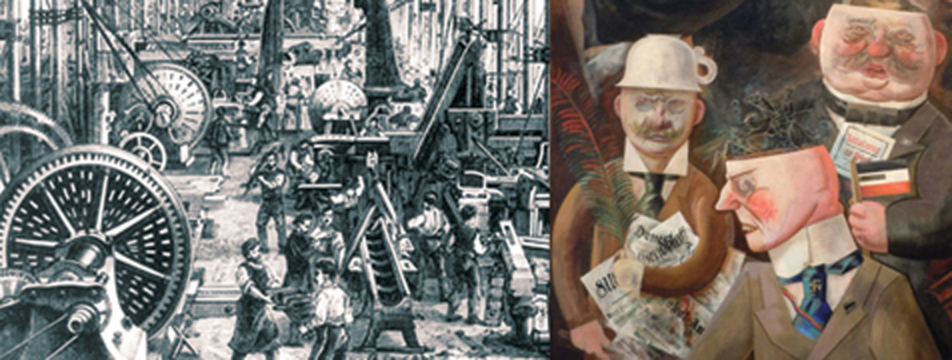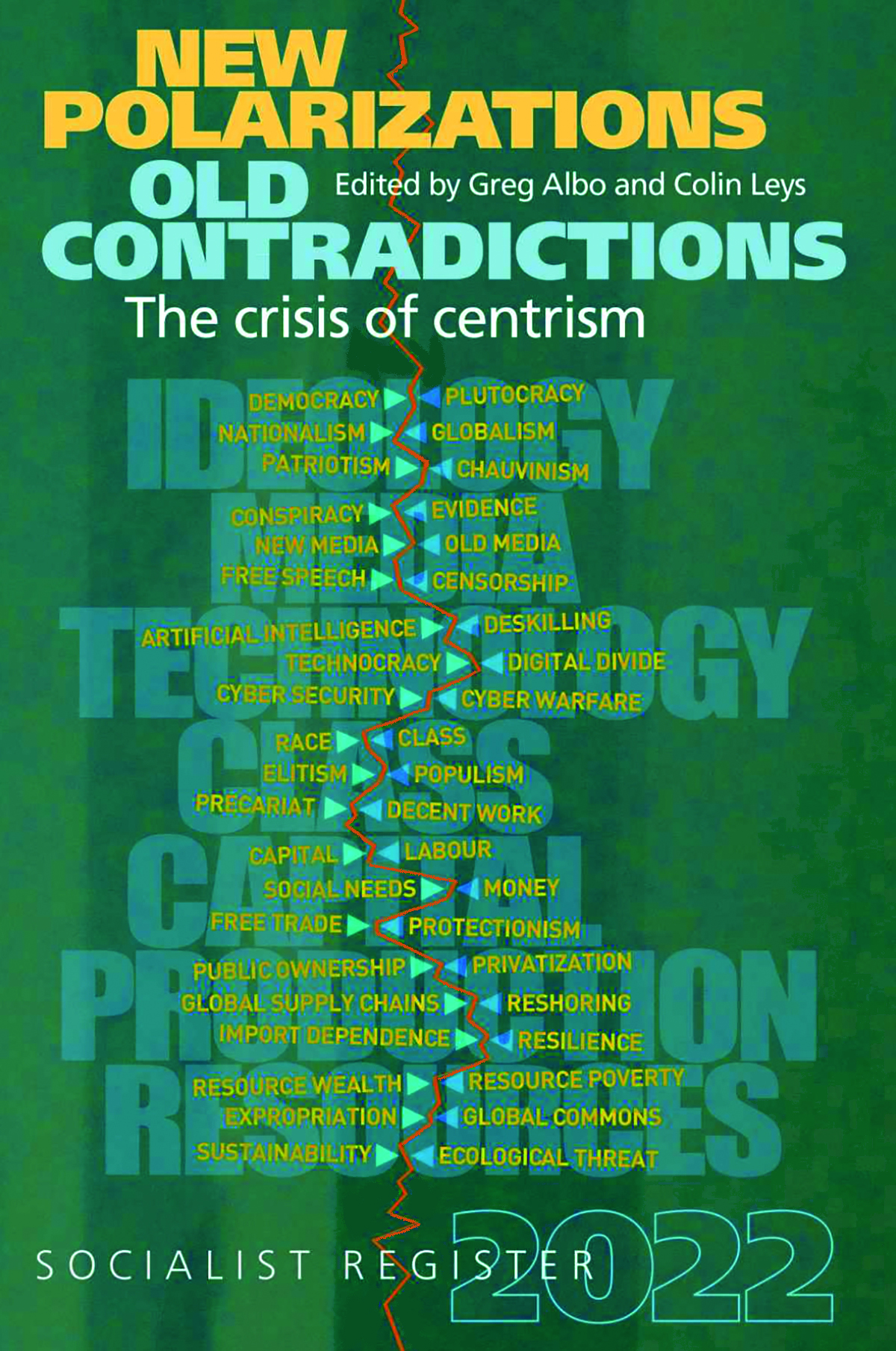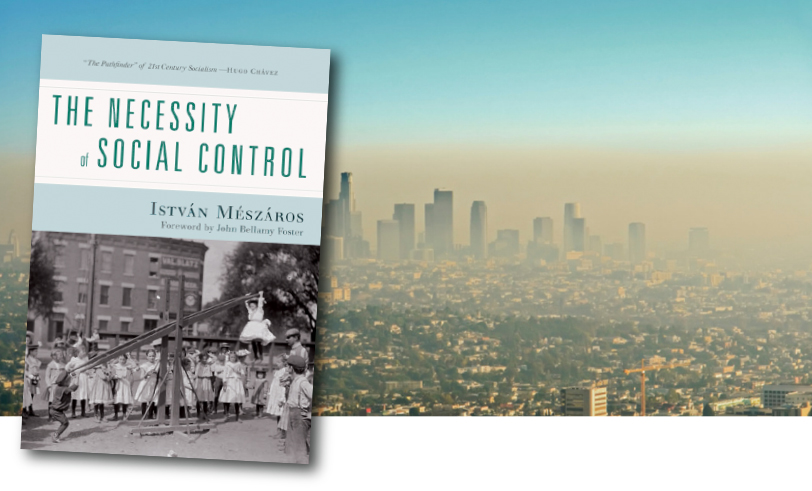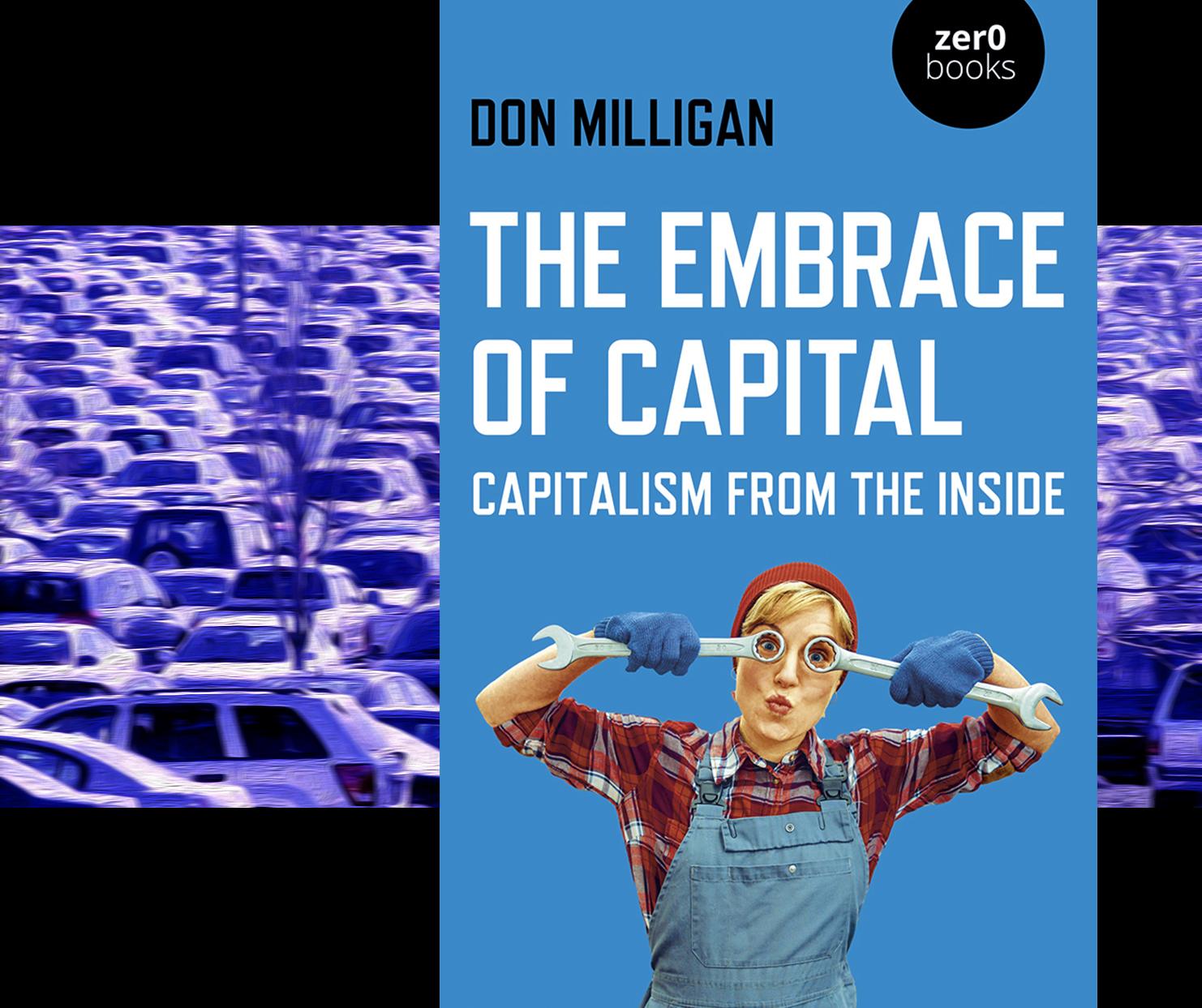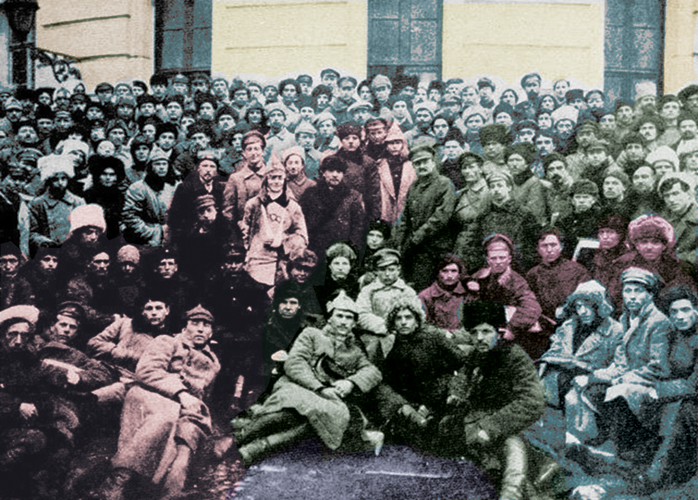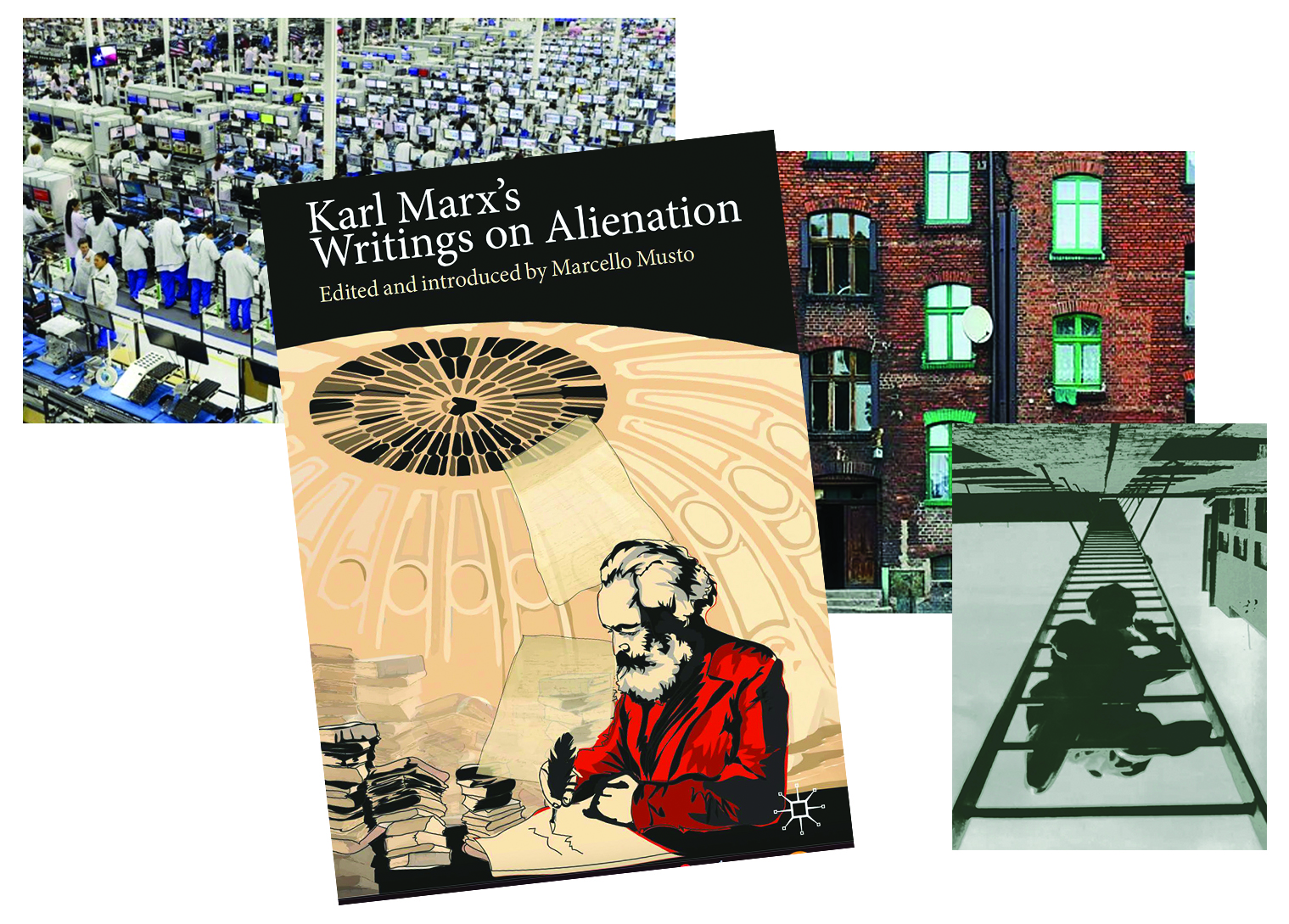Marx's Capital
A People’s History of Detroit and Detroit, I Do Mind Dying
In A PEOPLE’S HISTORY OF DETROIT, Mark Jay and Philip Conklin use a class framework to tell a sweeping story of Detroit from 1913 to the present, embedding Motown’s history in a global economic context DETROITL I DO MIND DYING tracks the extraordinary development of the Dodge Revolutionary Union Movement and the League of Revolutionary Black Workers
Old and New Contradictions: Opening Socialist Register 2022 Session—The Crisis of Centrism
The stage is set well for Socialist Register No. 58 in the Preface by Greg Albo and Colin Leys: “current multi-dimensional crisis, the center-right consensus that was struck around the neoliberal policy regime has been steadily splintering, with a phalanx of far right and neo-fascist groups inserting themselves into electoral politics and gaining prominence ‘in the streets’ (not least in motley demonstrations against pandemic measures of any kind, from lockdowns to masking). The observation that capitalism is always characterized by just such economic and political polarizations has preoccupied – even haunted –socialist analysis from its very origins: in Marx’s and Engels’ memorable phrase of revolutionary optimism in The Communist Manifesto, ‘the more or less open civil war, raging within existing society, up to the point where that war breaks out into open revolution, and … lays the foundation for the sway of the proletariat’. In the much picked-over chapter in Marx’s Capital on ‘The General Law of Capitalist Accumulation’, the language is just as vibrant but now stark in its imagery: ‘The greater the social wealth, the functioning capital, the extent and energy of its growth, and therefore also the greater the absolute mass of the proletariat and the productivity of itslabor, the greater is the industrial reserve army…. Accumulation of wealth at one pole is, therefore, at the same time the accumulation of misery, the torment of labor, slavery, ignorance, brutalization at the opposite pole, i.e. on the side of the class that produces its own product as capital.’
Karl Marx’s Writings on Alienation: A discussion with Marcello Musto and Michael Hardt
The event marks the publication of “Karl Marx’s on Alienation,” edited by Marcello Musto. This is an essential volume. The introduction written by Marcello provides a guide to the concept of alienation prior to Marx, Marx's essential thought and writings over three periods of his working life. This brief quote from Volume Three of CAPITAL is one of many presented and discussed: “The realm of freedom really begins only where labor determined by necessity and external expediency ends; it lies by its very nature beyond the sphere of material production proper. Just as the savage must wrestle with nature to satisfy his needs, to maintain and reproduce his life, so must civilized man, and he must do so in all forms of society and under all possible modes of production. This realm of natural necessity expands with his development, because his needs do too; but the productive forces to satisfy these expand at the same time. Freedom, in this sphere, can consist only in this, that socialized man, the associated producers, govern the human metabolism with nature in a rational way, bringing it under their collective control instead of being dominated by it as a blind power; accomplishing it with the least expenditure of energy and in conditions most worthy and appropriate for their human nature. But this always remains a realm of necessity. The true realm of freedom, the development of human powers as an end in itself, begins beyond it, though it can only flourish with this realm of necessity as its basis. The reduction of the working day is the basic prerequisite.” —Karl Marx
Come join Michael Hardt and Marcello Musto as they discuss with each other and those present from this essential volume for study—and practice.
Marx’s Grundrisse: Last two weeks until spring term
Online: Zoom link will be provided to registered participants“Forces of production and social relations – two different sides of the development of the social individual – appear to capital as mere means, and are merely means for it to produce on its limited foundation. In fact, however, they are the material conditions to blow this foundation sky-high…” —Karl Marx, The Grundrisse
Marx’s Grundrisse: Last two weeks until spring term
Online: Zoom link will be provided to registered participants“Forces of production and social relations – two different sides of the development of the social individual – appear to capital as mere means, and are merely means for it to produce on its limited foundation. In fact, however, they are the material conditions to blow this foundation sky-high…” —Karl Marx, The Grundrisse
Socialist Register 2022 — Polarization and Socialism: The Direction Forward
It is a truism that electoral politics and political identity in the USA and Europe today are polarized to a degree unknown since the 1930s. It is a commonplace among the pundits of the ruling class that somehow “both sides” must return to “moderate” common sense to avoid a violent rupture of our society. They seldom question the underlying causes of this polarization, let alone whether it is rooted in the very nature of late capitalism.
This is not the case with the contributors to the 58th volume of Socialist Register. From different perspectives, they ask us to think about the deep social contradictions exposed by increasing polarization of the most economically developed societies along lines of wealth, race, gender, nation-state, and region. Members of this class meet once each month for four months to discuss selected articles from SR 58 with editor Greg Albo, joined by various authors organized around the following themes on one Sunday a month from March 20 through May 115, 2022. The recording of the February 20 session is available by writing to info@marxedproject.org
The Necessity of Social Control by István Mészáros
“We are living in a time of unprecedented historical crisis, which affects all forms of the capital system, not just capitalism. It is easy to understand, then, that the only thing that could produce a viable solution to the contradictions that we have to face would be a radical socialist alternative to capital’s mode of social metabolic control.” István Mészáros
The Marx Revival: John Bellamy Foster and Marcello Musto
The Marx Revival: Key Concepts and New Interpretations
A focus on Ecology with John Bellamy Foster and a presentation on Communism with Marcello Musto.
“Scornful neglect and intemperate hostility, haughty dismissal and marginal course adoption, selective co-optation and selective bowdlerization: these are some of the strategies of establishment intellectuals over the years in response to the challenger of the thinker born 204 years ago in Trier. Yet, here we are near the beginning of the third decade of the 21st century, and it sometimes seems that Karl Marx’s ideas have never been as topical, or as commanding of respect and interest, as they are today.” —Marcello Musto, from the Preface, The Marx Revival
The Necessity of Social Control by István Mészáros
“We are living in a time of unprecedented historical crisis, which affects all forms of the capital system, not just capitalism. It is easy to understand, then, that the only thing that could produce a viable solution to the contradictions that we have to face would be a radical socialist alternative to capital’s mode of social metabolic control.” István Mészáros
The Embrace of Capital with author Don Milligan
The "spectre of communism" which Karl Marx confidently evoked in 1848 is now nothing more than a ghostly and ghastly nightmare, without form or substance. This is because working people have developed a love-hate relationship with capitalism. They hate insecurity, inequality, and greed, and love civic and political freedom. They love mass consumption, and accept the logic of commerce. Barreling along through wars, revolutions, epidemics, and crises of all sorts, working people in their millions have consistently dumfounded and dismayed the left, by their refusal to countenance any alternative to the capitalist mode of life. We have to ask: Is it possible to reverse this reality, and once again talk of the necessity of communism?
Socialist Register 2022 — Polarization and Socialism: The Direction Forward
It is a truism that electoral politics and political identity in the USA and Europe today are polarized to a degree unknown since the 1930s. It is a commonplace among the pundits of the ruling class that somehow “both sides” must return to “moderate” common sense to avoid a violent rupture of our society. They seldom question the underlying causes of this polarization, let alone whether it is rooted in the very nature of late capitalism.
This is not the case with the contributors to the 58th volume of Socialist Register. From different perspectives, they ask us to think about the deep social contradictions exposed by increasing polarization of the most economically developed societies along lines of wealth, race, gender, nation-state, and region. Members of this class meet once each month for four months to discuss selected articles from SR 58 with editor Greg Albo, joined by various authors organized around the following themes on one Sunday a month from March 20 through May 115, 2022. The recording of the February 20 session is available by writing to info@marxedproject.org
The Necessity of Social Control by István Mészáros
“We are living in a time of unprecedented historical crisis, which affects all forms of the capital system, not just capitalism. It is easy to understand, then, that the only thing that could produce a viable solution to the contradictions that we have to face would be a radical socialist alternative to capital’s mode of social metabolic control.” István Mészáros
4 Month Pass Offering Through September 30, 2022
Online: Zoom link will be provided to registered participantsThe four month pass is now $50 less than when initiating these passes. All events, classes and more for stated sliding scale fees until end of day, September 30, 2022.
A close reading of Karl Marx’s Writings on Alienation
In this anthology Marcello Musto focuses in on Marx’s later economic works, in which his thoughts on alienation were elaborated rather differently than in his philosophical manuscripts. Additionally, the writings collated in this volume are unique in their presentation of not only Marx’s critique of capitalism, but also his suggestions about communist society. This wide-ranging collection of Marx’s ideas on alienation provides an important critical tool both for understanding the past and for building a critique of contemporary society.
Corporate Capitalism and the Integral State
Video available: https://youtu.be/-t2O5SmzCr4
Steve Maher’s new book uses the relationship between the American state and General Electric from 1880 to 1980 to develop an original conception of what Gramsci called the “integral state.” It shows how state power has been critical for the development and evolution of corporate organization.




